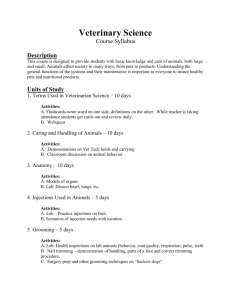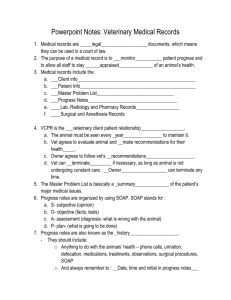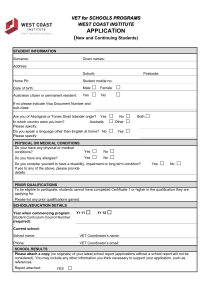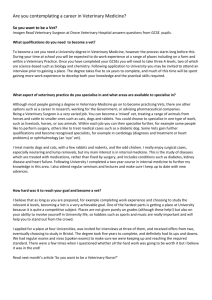NCC Veterinary Technology Course Descriptions
advertisement
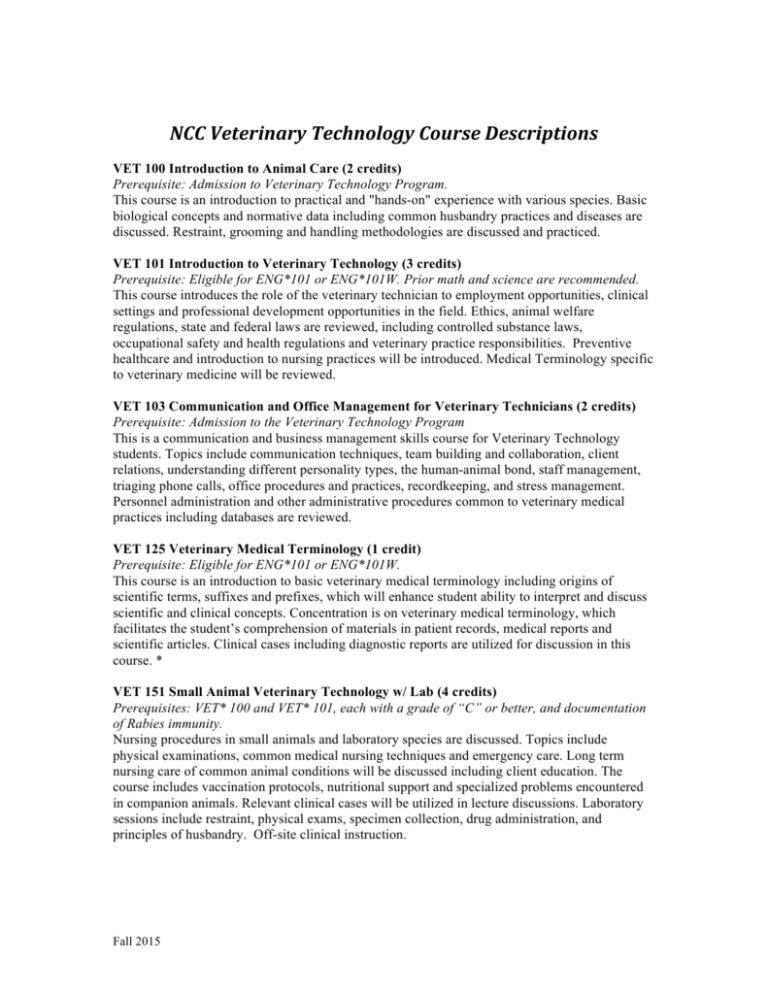
NCC Veterinary Technology Course Descriptions VET 100 Introduction to Animal Care (2 credits) Prerequisite: Admission to Veterinary Technology Program. This course is an introduction to practical and "hands-on" experience with various species. Basic biological concepts and normative data including common husbandry practices and diseases are discussed. Restraint, grooming and handling methodologies are discussed and practiced. VET 101 Introduction to Veterinary Technology (3 credits) Prerequisite: Eligible for ENG*101 or ENG*101W. Prior math and science are recommended. This course introduces the role of the veterinary technician to employment opportunities, clinical settings and professional development opportunities in the field. Ethics, animal welfare regulations, state and federal laws are reviewed, including controlled substance laws, occupational safety and health regulations and veterinary practice responsibilities. Preventive healthcare and introduction to nursing practices will be introduced. Medical Terminology specific to veterinary medicine will be reviewed. VET 103 Communication and Office Management for Veterinary Technicians (2 credits) Prerequisite: Admission to the Veterinary Technology Program This is a communication and business management skills course for Veterinary Technology students. Topics include communication techniques, team building and collaboration, client relations, understanding different personality types, the human-animal bond, staff management, triaging phone calls, office procedures and practices, recordkeeping, and stress management. Personnel administration and other administrative procedures common to veterinary medical practices including databases are reviewed. VET 125 Veterinary Medical Terminology (1 credit) Prerequisite: Eligible for ENG*101 or ENG*101W. This course is an introduction to basic veterinary medical terminology including origins of scientific terms, suffixes and prefixes, which will enhance student ability to interpret and discuss scientific and clinical concepts. Concentration is on veterinary medical terminology, which facilitates the student’s comprehension of materials in patient records, medical reports and scientific articles. Clinical cases including diagnostic reports are utilized for discussion in this course. * VET 151 Small Animal Veterinary Technology w/ Lab (4 credits) Prerequisites: VET* 100 and VET* 101, each with a grade of “C” or better, and documentation of Rabies immunity. Nursing procedures in small animals and laboratory species are discussed. Topics include physical examinations, common medical nursing techniques and emergency care. Long term nursing care of common animal conditions will be discussed including client education. The course includes vaccination protocols, nutritional support and specialized problems encountered in companion animals. Relevant clinical cases will be utilized in lecture discussions. Laboratory sessions include restraint, physical exams, specimen collection, drug administration, and principles of husbandry. Off-site clinical instruction. Fall 2015 VET 152 Large Animal Veterinary Technology w/ Lab (4 credits) Prerequisites: VET* 100 and VET* 101, each with a grade of “C” or better, and documentation of Rabies immunity. The course focuses on the specifics related to large animal medicine and nursing practices including techniques. Lectures include anatomy and physiology, nutrition and breeding of agricultural species. The etiology of disease, transmission, prevention and disease control are discussed. Topics include nursing care, diagnostic techniques, reproduction, husbandry, and common diseases. Laboratory sessions include restraint, physical exams, specimen collection, drug administration, and principles of husbandry. Supervised field trips are required. VET 201 Anatomy & Physiology w/Lab I (4 credits) Prerequisite: Admission to Veterinary Technology Program. Veterinary anatomy and physiology of domestic species presented as a two course series. The anatomic structures and physiologic functions of domestic animals including companion species are discussed. The first semester reviews the basic foundations of structure and function of the most common species including the integumentary, skeletal, muscular, nervous, endocrine, and digestive systems in addition to cellular aspects of metabolism. Comparative aspects of other species including avian, reptilian and farm species are provided. Lecture and laboratory exercises emphasize the understanding of the organized body state and the relationship of various components including cells, tissues, organs and body systems. VET 202 Veterinary Anatomy & Physiology w/ Lab II (4 credits) Prerequisite: VET *201 with a grade of “C” or better. Veterinary Anatomy and Physiology II with Lab. This course is a continuation of Veterinary Anatomy and Physiology I, with discussion of the respiratory, circulatory, urinary and reproductive systems. Relevant clinical topics are utilized during this course. VET 205 Veterinary Laboratory Procedures (3 credits) Prerequisites: MED* 125, VET* 151, VET* 152, and VET* 202, each with a grade of “C” or better. VET* 205 must be taken concurrently with VET* 212 and VET* 230. The theory behind clinical sample analysis utilizing clinical laboratory procedures including specimen collection, hematology, cytology, blood chemistry, urinalysis, necropsy technique, and serology. Emphasis is on manual performance of basic laboratory diagnostic procedures and discussion of the relevance of laboratory findings to the veterinary practitioner. VET 212 Principles of Imaging w/ Lab (1 credit) Prerequisites: MED* 125, VET* 151, VET* 152, and VET* 202, each with a grade of “C” or better. VET* 212 must be taken concurrently with VET* 205 and VET* 230. The theory and principles of radiology and radiation safety. Topics include radiologic and imaging principles and practices and the uses in patient diagnosis. Animal restraint, positioning, special diagnostic techniques and imaging are reviewed. Ultrasonography, Computerized Axial Tomography, Magnetic Resonance Imaging and Positron Emission Tomography will be discussed. VET 220 Animal Pathology (3 credits) Prerequisite: VET* 205 with a grade of “C” or better. The course encompasses health and diseases of the major domestic animal species. Major systems are discussed with a review of anatomy and physiology. Clinical signs of organ dysfunction, pathophysiology, diagnostic tests, treatment and prevention are reviewed. The lecture topics are approached in an organ system format including integumentary, musculoskeletal, neurosensory, cardiovascular, respiratory, digestive, renal and reproductive systems. Fall 2015 VET 230 Veterinary Anesthesia & Surgical Nursing with Lab (4 credits) Prerequisites: MED* 125, VET* 151, VET* 152, and VET* 202, each with a grade of “C” or better. VET* 230 must be taken concurrently with VET* 205 and VET* 212. Lectures and demonstrations in general anesthetic technique, standard surgical procedure, and operating room conduct. The emphasis is on surgical technology including equipment and supply nomenclature, patient monitoring, aseptic, sterile technique, preoperative care of the patient and emergency medicine. Classifications and mechanisms of action for commonly used anesthetics, and analgesics are discussed. Topics include intravenous catheterization techniques, CPR, and oncology therapeutics. BIO 235 Microbiology (4 credits) Prerequisites: Eligibility for ENG 101, one semester of college work in both Biology and Chemistry or BIO 211 This is an introduction to general microbiology. The course is designed to meet the needs of preallied health students as well as biology or science majors. Topics include the structure, physiology, and molecular biology of microorganisms as well as the interactions between microbes and their hosts, including their role in the environment. Students also learn how microbes are studied and how they can cause disease and yet are essential to human well being. There are laboratory exercises each week that will teach the basics of aseptic techniques as well as handling, culturing, and identifying microbes. Lecture: 3 hours per week. Laboratory: 3 hours per week. BIO 238 Parasitology (3 credits)** Prerequisite: VET* 151, strongly recommended VET* 205. This course is intended to familiarize students with the parasites of importance in the veterinary field. The course includes both lecture and laboratories to reinforce the knowledge and identification skills necessary for the veterinary technician. VET 240 Periodontology and Oral Radiology (2 credits) Prerequisites: VET* 205 and VET* 212, each with a grade of “C” or better. This course is an introduction to veterinary dentistry, which has become a significant part of veterinary practices. Topics include oral anatomy, terminology periodontology oral radiography endodontics, orthodontics and restorative dentistry. Tasks performed by veterinary technicians, including oral radiography will be discussed. VET 250 Principles of Pharmacology for Veterinary Technology (3 credits) Prerequisite: VET *125 with a grade of “C” or better. Prior math and science recommended. The study of dose and dosage in applied pharmacology. Topics include basic mathematics, conversions, measurements, drug calculations, drug orders and fluid rate calculations. The major classes of drugs used in therapeutics, dose response characteristics, mechanisms of action, major physiological effects, toxicity and drug interactions are discussed. A review of laws applying to licensure and use of controlled substances in veterinary medicine is included. Fall 2015 VET 280 Veterinary Technology Externship (1 credit, 80 hrs. contact time) Prerequisites: VET *205, VET* 212, and VET* 230, each with a grade of “C” or better, and approval of the Vet Tech Program Coordinator. This externship will offer a supervised experience under the direction of a licensed veterinarian, certified technician, or animal research technician. Students will refine skills learned in all previous veterinary technology courses through placement at an off-site veterinary hospital, private practice, or laboratory facility. VET 281 Veterinary Technology Externship (2 credits, 160 hrs. contact time) Prerequisites: VET *205, VET* 212, and VET* 230, each with a grade of “C” or better, and approval of the Vet Tech Program Coordinator. This externship will offer a supervised experience under the direction of a licensed veterinarian, certified technician, or animal research technician. Students will refine skills learned in all previous veterinary technology courses through placement at an off-site veterinary hospital, private practice, or laboratory facility. * Students who took MED 125 before VET 125 was adopted are not required to take this course. ** Course will be instructed by VTP faculty. The Curriculum is subject to change while the Program is being developed. Fall 2015
